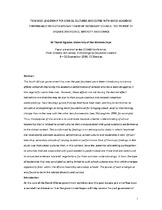Towards leadership for school cultures associated with good academic performance in South African township secondary schools: the ‘power’ of organic emergence, diversity and service
Abstract
The South African government has over the past fourteen years been introducing numerous efforts aimed at improving the academic performance of schools who have been struggling in this regard for some time now. However, these efforts are not having the desired effect. Indications are that this may be due to their power-coercive and rational-empirical underpinnings. Such leanings ignore findings that have been been pointing to normative reeducative underpinnings as being more foundational for bringing about ,and/ or maintaining, change than is the case with the other two frameworks (see, McLaughlin, 1993, for example). Thus, the purpose of this article is to contribute towards a better understanding of school leadership that is related to school cultures that are associated with good academic performance in the stated context. This is informed by findings in an ethnographic study in which I explored the relationship between academic performance, school culture and leadership in two ‘African’ township secondary schools of varying academic performance. One of the major findings in this study was that school cultures that, in this context, have the potential of enabling participation in activities that are associated with good academic performance are those that are communal in nature but embrace ‘societal’ negotiations for their common understandings. In turn, the type of leadership that was concluded as being linked to such school cultures was that which emerges organically from within the African township secondary schools. The power of such emergence was found to be in the related diversity and service.

